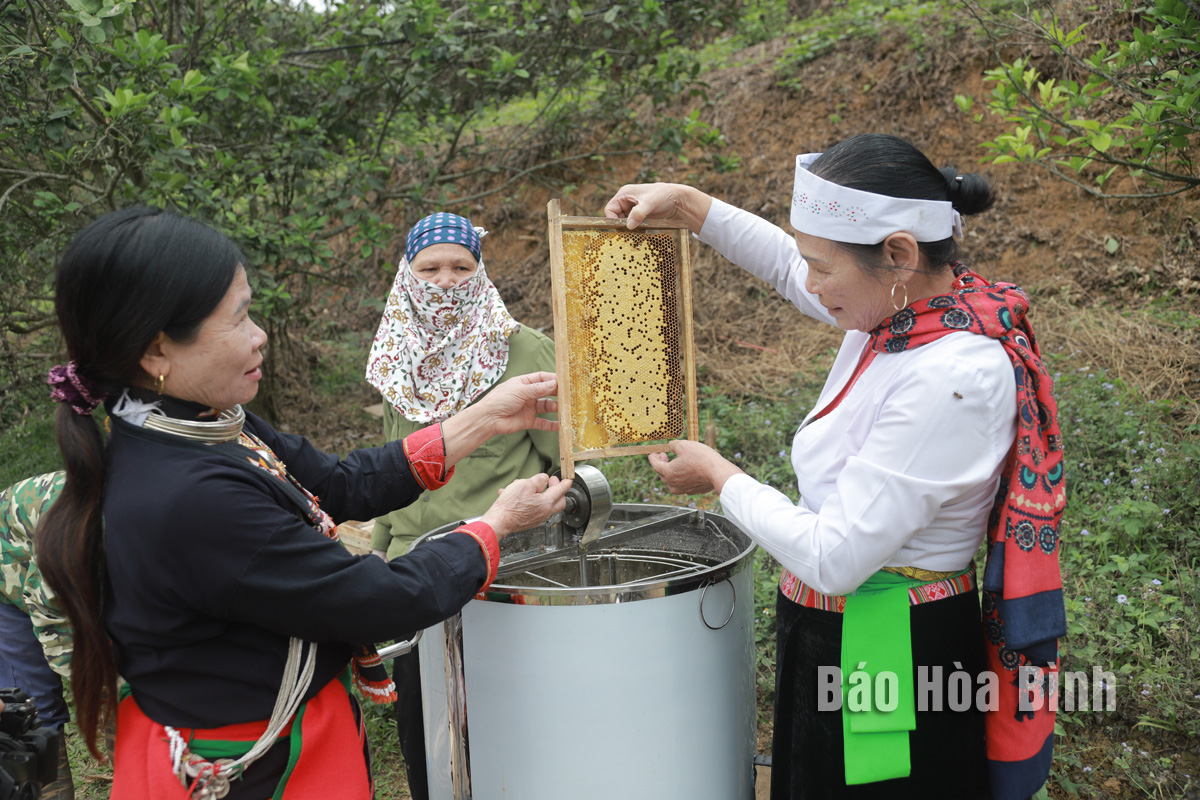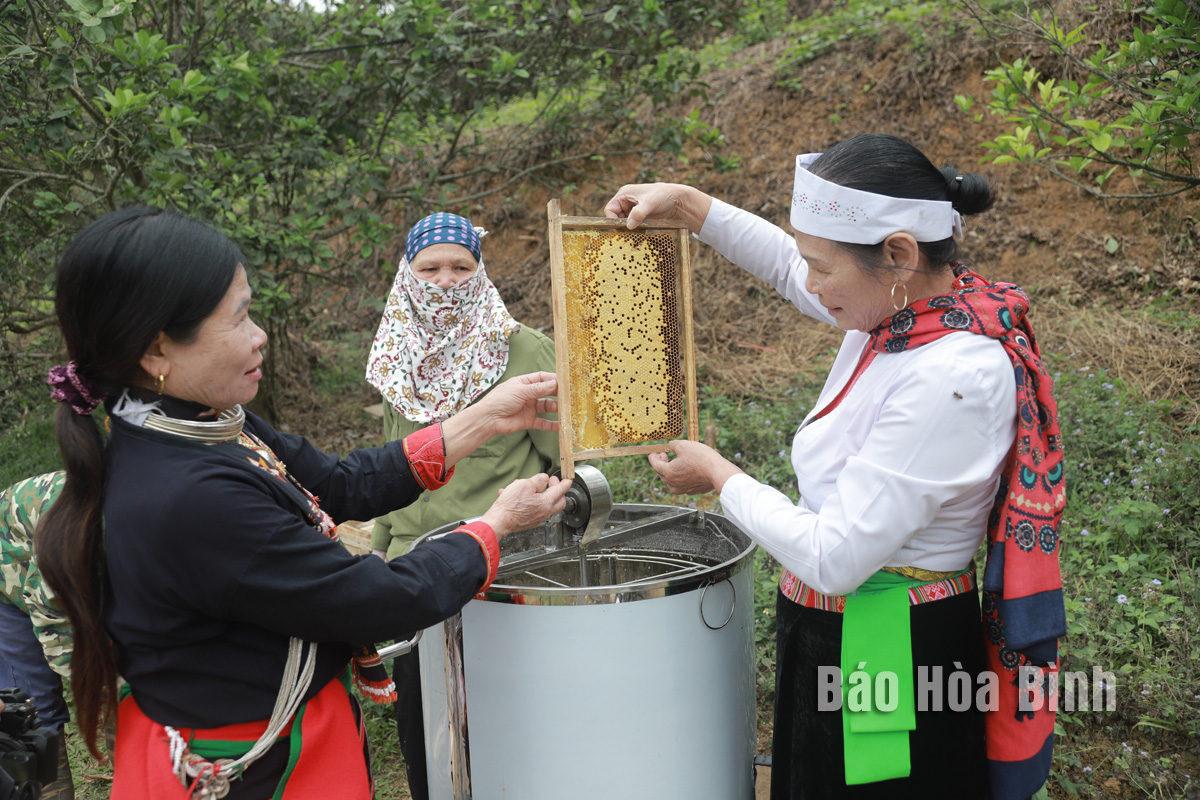
Dao Village’s honey – a product certified with a 3-star OCOP (One Commune One Product) rating by Thong Nhat Agricultural Cooperative in Dao Village (Hoa Binh City) – is highly regarded by consumers for its quality, richness, and variety in packaging. The distinctively sweet taste of Dao Village’s honey leaves a lasting impression on anyone who has tried it.
The members of Thong Nhat Agricultural Cooperative in Dao Village (Hoa Binh City) frequently share experiences and beekeeping techniques with each other.
Located on the outskirts of Hoa Binh City, Thong Nhat Ward is surrounded by high mountains and it features a tropical monsoon climate. These natural conditions are ideal for the growth of various flowers, fruit trees, and medicinal plants – all vital food sources for honey bees. The lives of the local residents are closely tied to the hills and farmlands, which inspired the cooperative members to develop a model of honey beekeeping. By leveraging the strengths of the region and combining them with traditional knowledge, Thong Nhat Agricultural Cooperative in Dao village has guided the local people to research and implement professional beekeeping processes to produce natural products.
Mr. Nguyen Van Cuong, a cooperative member with nearly 10 years of beekeeping experience, says: "With nearly 400 bee colonies, my family produced nearly 1,000 liters of honey in 2024, earning around 150 million VND. After harvesting the raw honey, the cooperative uses machinery and modern technology to reduce the water content, allowing long-term preservation without compromising the honey's nutritional value. Once processed, the honey’s moisture content is reduced to below 18%, meeting the European standards and qualifying the product for export to demanding markets.”
Founded in 2015, Thong Nhat Agricultural Cooperative in Dao village now has over 80 members, more than 90% of whom are of the Dao ethnic minority. Currently, 5-member households are engaged in beekeeping, maintaining over 1,000 colonies. In 2024, the cooperative's honey production reached over 4,000 liters, sold at prices ranging from 160,000 to 180,000 VND per liter.
As a natural sweetener, honey contains mainly sugars along with a mix of amino acids, vitamins, minerals, iron, zinc, and antioxidants, which are beneficial to health. Dao village’s honey meets VietGAP standards and complies with the food safety production and business certifications. Additionally, the cooperative has been granted the right to use the certified "Hoa Binh Honey” trademark and QR-coded traceability labels, helping to boost consumer trust and meet the strict requirements of the global markets. These achievements reflect the tireless efforts of the cooperative members to improve the reputation, value, and competitiveness of Dao Village’s honey in the market.
Mrs. Nguyen Thi Binh, the Director of Thong Nhat Agricultural Cooperative in Dao village, states that the best honey is harvested between every February and July when countless flower species bloom across Hoa Binh mountains. This floral diversity contributes to the honey’s unique flavor and color, setting it apart from other products. The cooperative currently provides jobs for hundreds of employees, helping to reduce poverty and improve the income and living standards of its Muong and Dao ethnic members. Today, Dao Village’s honey with eye-catching 500ml packaging is sold at various OCOP product display booths throughout Hoa Binh City.
The hard work and dedication of Dao villagers in Thong Nhat embody the thick, golden drops of honey – 100% pure and natural, meeting the "three no’s” criteria: no additives, no preservatives, and non-toxic. With the continued investment in upgrading equipment, packaging innovation, and the application of digital technology, the cooperative is expanding e-commerce operations to improve quality and broaden its market. In the near future, Thong Nhat Agricultural Cooperative in Dao Village aims to further strengthen its brand and bring Dao Village’s honey to both domestic and international consumers.
According to data from the Hoa Binh Provincial Party Committee, the industrial production index for the first six months of 2025 is estimated to have increased by 20% compared to the same period last year. This marks the highest year-on-year growth rate for this period since 2020.
In the first six months of 2025, Hoa Binh province’s export turnover was estimated at 1.145 billion USD, marking an 18.11% increase compared to the same period in 2024. Import turnover was estimated at $ 804 million, a 17.15% increase, which helped the province maintain a positive trade balance.
The lives of the ethnic minority farmers in Tan Lac district have gradually improved thanks to the new directions in agricultural production. This is a testament to the collective strength fostered through the professional associations and groups implemented by various levels of the district’s Farmers’ Union.
With the motto the "product quality comes first,” after nearly one year of establishment and operation, Muong village’s Clean Food Agricultural and Commercial Cooperative, located in Cau Hamlet, Hung Son Commune (Kim Boi district), has launched reputable, high-quality agricultural products to the market that are well-received by consumers. The products such as Muong village’s pork sausage, salt-cured chicken, and salt-cured pork hocks have gradually carved out a place in the market and they are on the path to obtaining the OCOP certification.
In the past, the phrase "bumper harvest, rock-bottom prices" was a familiar refrain for Vietnamese farmers engaged in fragmented, small-scale agriculture. But today, a new spirit is emerging across rural areas of Hoa Binh province - one of collaboration, organisation, and collective economic models that provide a stable foundation for production.
Maintaining growing area codes and packing facility codes in accordance with regulations is a mandatory requirement for agricultural products to be eligible for export. Recently, the Department of Agriculture and Environment of Hoa Binh province has intensified technical supervision of designated farming areas and packing facilities to safeguard the "green passport" that enables its products to access international markets.



